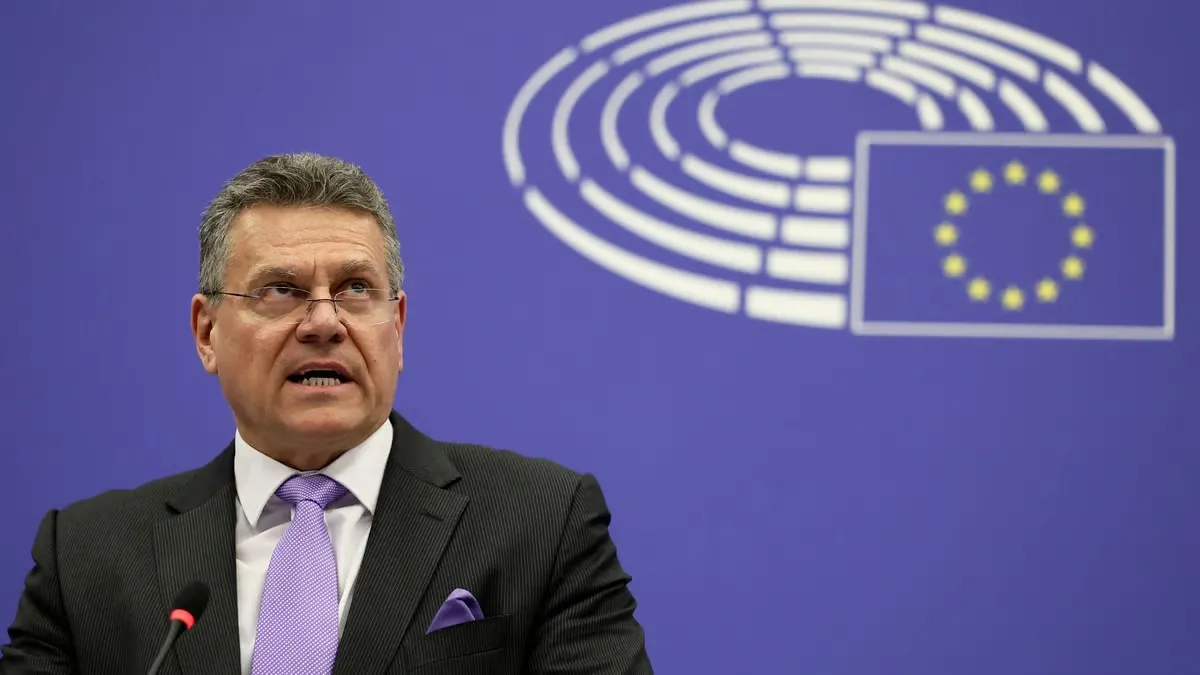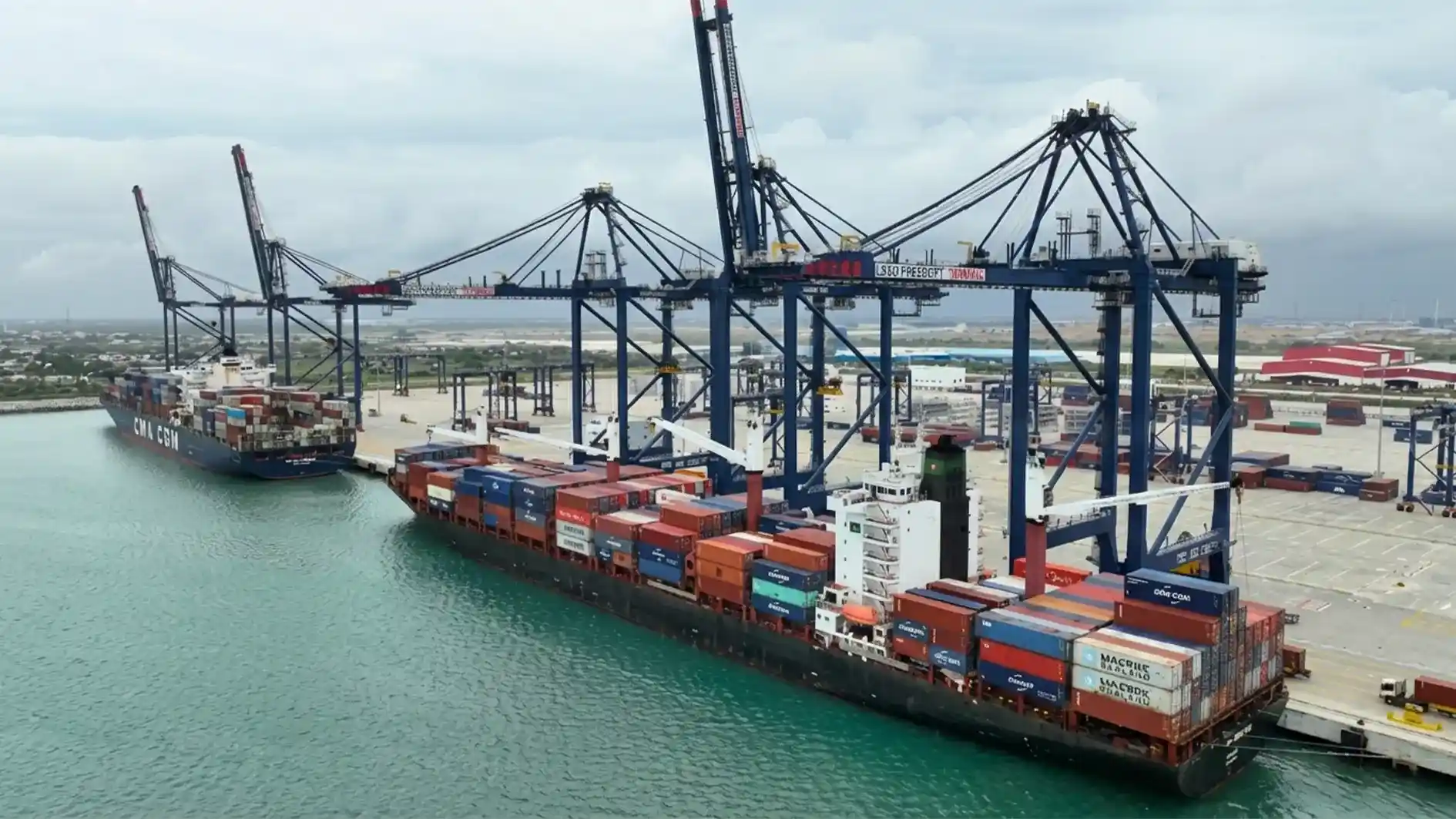In a recent high-stakes address in Washington, Maros Sefcovic, the European Commissioner for Trade and Economic Security, delivered a stern warning to U.S. policymakers amid escalating trade tensions. Speaking at the American Enterprise Institute on February 19, 2025, Sefcovic declared that the European Union (EU) would respond “firmly and swiftly” to protect its interests if President Donald Trump’s administration imposes new tariffs on EU goods. Rejecting Trump’s assertions that U.S.-EU trade relations are unfair, the commissioner emphasized that the transatlantic partnership has been mutually beneficial—characterized by predictability, stability, and a high level of economic interdependence.
A Foundation Built on Mutual Benefit
The Strength of Transatlantic Trade
The EU and the United States share one of the world’s most important economic relationships, with transatlantic trade accounting for nearly 30 percent of global commerce. Sefcovic reiterated that the longstanding partnership between the two blocs is built on a foundation of shared values and mutual interests. “It is the very definition of a win-win partnership, and there is nothing unfair,” he stated, arguing that the current level of tariffs and trade arrangements has supported economic growth on both sides of the Atlantic.
He further noted that the EU is one of the most open economies in the world, with over 70 percent of its imports entering tariff-free—a policy framework designed to promote competition and consumer choice. This openness has enabled European businesses to integrate deeply into global supply chains while also fostering innovation and competitiveness.
Unilateral Tariff Threats: A Risk to Stability
At the heart of the controversy are U.S. threats of sudden, unilateral tariff increases. President Trump has repeatedly hinted at the imposition of “reciprocal tariffs” on allies and adversaries alike, contending that current trade practices with the EU are imbalanced and discriminatory. These proposed tariffs would not only target European exports but would also account for perceived disparities, such as differences in value-added taxes (VAT) and other indirect taxes that European products face.
Sefcovic countered these claims by emphasizing that any such tariffs would create unnecessary barriers to trade and ultimately hurt businesses and workers on both sides. “If the United States imposed tariffs on EU products, this would create unnecessary barriers to exports, businesses and workers on both sides of the Atlantic,” he warned. The commissioner’s message was clear: while the EU prefers to avoid confrontation, it is prepared to defend its economic interests through all available means.
The Dynamics of Tariff Policy and Global Trade
The U.S. Tariff Strategy and Its Implications
Over the past few years, the U.S. government has actively employed tariffs as a tool of economic policy. Notably, tariffs on steel, aluminum, and Chinese goods have been central to Washington’s strategy of protecting domestic industries and correcting trade imbalances. In recent months, Trump has signaled a willingness to extend these measures to other sectors, including automotive, semiconductors, and pharmaceuticals.
While the U.S. argues that such tariffs are necessary to protect American jobs and industries, critics contend that these measures disrupt global supply chains, increase production costs, and lead to retaliatory actions from trading partners. Germany’s automotive lobby, for example, has warned that proposed tariffs on cars could raise costs for U.S. consumers, potentially stifling demand and harming both sides of the market.
Historical Precedents and the Role of the WTO
The current dispute echoes past episodes in transatlantic trade history. In earlier decades, both the EU and the U.S. have faced off over tariffs and trade barriers, with the World Trade Organization (WTO) serving as the principal arbiter in these disputes. The WTO’s rules-based framework has traditionally provided a forum for resolving such conflicts through negotiation and adjudication, rather than unilateral action.
Trade experts caution that ignoring this multilateral framework could lead to a dangerous spiral of protectionism. “We are at risk of entering a tariff war that could have cascading effects on global supply chains,” one analyst noted. Indeed, the imposition of new U.S. tariffs on European goods could force the EU to retaliate with its own measures, which would not only disrupt bilateral trade but could also undermine the global trading system.
The Cost of Escalation: Economic and Political Ramifications
Should the U.S. proceed with unilateral tariff increases, the economic consequences could be severe. Tariffs raise the cost of imported goods, which can lead to higher prices for consumers and reduced competitiveness for exporters. In sectors such as agriculture, automotive, and technology, where integrated supply chains span continents, the impact of additional tariffs can be particularly disruptive.
Moreover, an escalation of tariffs could have political ramifications beyond economics. Transatlantic relations have long been a cornerstone of Western security and political cooperation. Trade disputes of this magnitude can spill over into other areas of policy, straining diplomatic relations and complicating joint efforts on global challenges such as climate change, security, and digital transformation.
The EU’s Strategic Response
A Commitment to Retaliation, But a Preference for Dialogue
Despite the readiness to retaliate if necessary, EU officials have made it clear that the bloc’s preferred approach is to resolve trade disputes through dialogue and negotiation. “Both sides have to be responsible in dealing with each other,” Sefcovic stressed, highlighting the importance of maintaining stable and predictable economic relations. The EU remains committed to the rules-based trading system and continues to support efforts to reform the WTO to better address contemporary challenges.
This balanced stance reflects a broader EU strategy: while the bloc is prepared to take decisive action to defend its interests, it also recognizes that escalating trade tensions is in nobody’s long-term interest. The emphasis, therefore, is on preventing a deterioration of trade relations through constructive engagement with U.S. counterparts.
Coordinated Action Among EU Member States
One of the key strengths of the EU in addressing external economic pressures is its ability to coordinate policy among its 27 member states. In recent years, European leaders have increasingly prioritized the need for a unified response to global trade challenges. Behind the scenes, there have been extensive consultations among national governments, industry groups, and trade unions to craft a coherent strategy that reflects the diverse interests of the continent.
This internal coordination is critical, as individual member states might otherwise be tempted to pursue unilateral measures that could undermine the collective bargaining power of the EU. By presenting a united front, the EU can negotiate more effectively with external partners and ensure that any retaliatory measures are calibrated to protect both economic interests and the broader stability of the global trading system.
Strengthening Global Trade Norms
The current dispute also highlights the EU’s broader commitment to upholding global trade norms. European policymakers argue that free trade and multilateral cooperation are essential not only for economic prosperity but also for promoting peace and stability in an increasingly interconnected world. As such, the EU has been a vocal advocate for reforming the WTO and ensuring that trade rules are enforced consistently.
This commitment is reflected in the EU’s response to U.S. tariff threats. By framing the dispute in terms of fairness and the rule of law, the EU seeks to rally international support for a rules-based trading system. “Our approach is not about taking sides but about upholding principles that benefit all nations,” one European trade expert remarked. In this light, any U.S. tariff measures would be seen not merely as an economic maneuver but as a challenge to the very foundations of the global trading order.
The Broader Global Context
Transatlantic Trade in a Shifting World
The transatlantic relationship, while robust, exists in a rapidly changing global environment. Technological advancements, evolving consumer preferences, and the rise of emerging economies are reshaping global trade patterns. Against this backdrop, both the EU and the U.S. are reexamining their trade policies to better position themselves for the future.
In recent years, the EU has pursued several ambitious trade agreements with countries in Asia, Latin America, and Africa, seeking to diversify its export markets and reduce dependency on any single trading partner. Meanwhile, the U.S. has been more protectionist under recent administrations, prioritizing domestic industries over free trade. This divergence in trade philosophy has created friction on issues ranging from intellectual property to environmental standards.
The current dispute over tariffs is emblematic of these broader shifts. It reflects deep-seated differences in how the two blocs view global economic competition and the role of government in managing trade. For the EU, free trade is not only a driver of economic growth but also a means of promoting international cooperation and shared prosperity. For the U.S., on the other hand, tariffs are seen as a pragmatic tool to address imbalances and protect domestic jobs.
Implications for Global Supply Chains
Global supply chains have become extraordinarily complex in recent decades, with components sourced from multiple countries and products assembled in various locations. Tariff barriers, even if modest in percentage terms, can have outsized effects on these intricate networks. For instance, a tariff on a critical component can disrupt the production of finished goods, leading to delays, higher costs, and reduced competitiveness in global markets.
Experts warn that any escalation in the U.S.-EU trade dispute could trigger a domino effect, impacting supply chains well beyond the transatlantic region. Companies might be forced to reconfigure their operations, seek alternative suppliers, or pass increased costs on to consumers. In industries such as automotive and technology—where precision and timing are paramount—such disruptions could be particularly damaging.
Moreover, as global trade becomes increasingly digitized, the interdependence between physical goods and digital services intensifies. Tariffs on physical goods may also affect digital trade indirectly, by altering investment flows and market dynamics in sectors like telecommunications and e-commerce. In this context, maintaining open and predictable trade channels is essential not only for manufacturers but also for service providers and consumers worldwide.
A Cautionary Tale of Escalation
Historical precedents remind us that trade disputes can quickly spiral into broader economic conflicts. The Smoot-Hawley Tariff of the 1930s, for example, is widely cited as a contributing factor to the deepening of the Great Depression. While modern economies are more interconnected and sophisticated, the risk of unintended consequences remains. An ill-conceived tariff policy could unleash retaliatory measures that harm not only the targeted industries but also the overall health of the global economy.
In this light, Sefcovic’s warnings are not merely rhetoric—they serve as a cautionary signal to policymakers on both sides of the Atlantic. The message is clear: while it is possible to pursue national interests through tariff measures, doing so without regard for the broader global context could trigger a chain reaction with serious economic repercussions.
Looking Ahead: Prospects for Resolution
The Importance of Diplomatic Engagement
Even as tensions simmer, there remains considerable room for diplomatic engagement. Both the EU and the U.S. have much to gain from maintaining a stable and cooperative trading relationship. Behind closed doors, high-level negotiations are likely to continue as each side seeks to address their grievances without resorting to drastic measures.
Recent dialogues between U.S. trade representatives and European officials have focused on finding common ground, particularly in areas such as regulatory standards, market access, and technology transfer. These discussions underscore the recognition that unilateral action is rarely in the best interest of either party. Instead, a collaborative approach—grounded in mutual respect and a commitment to shared economic prosperity—appears to be the preferred path forward.
Strengthening Multilateral Frameworks
The current dispute also highlights the need for reform and strengthening of multilateral institutions like the WTO. Both the EU and the U.S. have expressed interest in modernizing global trade rules to better reflect the realities of the 21st century, including digital trade, environmental sustainability, and fair labor practices. A reformed WTO could offer a more effective platform for resolving disputes and preventing unilateral tariff hikes from destabilizing global commerce.
Efforts to strengthen these institutions are gaining traction among other major economies as well, suggesting that the U.S. and the EU might eventually find common cause in pushing for a more balanced and resilient international trade framework. Such reforms would not only benefit the two blocs but also contribute to a more stable global economic order.
Conclusion: A Crossroads for Transatlantic Trade
Maros Sefcovic’s remarks in Washington have cast a spotlight on a critical juncture in U.S.-EU trade relations. The threat of new U.S. tariffs on European goods is not merely a technical trade dispute—it is a fundamental challenge to a partnership that has underpinned global economic growth for decades. With transatlantic trade representing nearly 30 percent of global commerce, any disruption to this relationship would have far-reaching consequences for businesses, consumers, and policymakers worldwide.
While the EU has signaled its readiness to retaliate swiftly if necessary, its preference remains clear: resolve differences through dialogue, uphold the rules-based trading system, and ensure that trade policies serve the broader interests of economic stability and shared prosperity. The coming months will be crucial, as both sides navigate a complex landscape of competing interests, geopolitical pressures, and the ever-present need for economic predictability.
In an era marked by rapid technological change and shifting global alliances, the stakes have never been higher. The transatlantic trade relationship is more than just an economic exchange—it is a cornerstone of the international order. As policymakers on both sides of the Atlantic weigh their options, the world watches closely, aware that the decisions made today will shape the trajectory of global trade for years to come.
Ultimately, the unfolding dispute serves as a reminder that in an interconnected world, unilateral measures are rarely the answer. Instead, cooperation, negotiation, and adherence to international norms remain the most effective strategies for ensuring that trade remains a force for global prosperity rather than a source of conflict. With leaders on both sides expressing a desire to avoid escalation, there is cautious optimism that this latest challenge can be navigated without triggering a full-blown trade war.
As the dialogue continues, businesses, consumers, and governments alike will be looking for signs of compromise and reform. The emphasis on stability, predictability, and mutual benefit must guide the actions of both the EU and the U.S. if they are to preserve one of the world’s most valuable economic partnerships.
In the final analysis, the situation represents both a challenge and an opportunity—a moment when the global community can reaffirm its commitment to free trade, fair competition, and a rules-based international order. The coming months will test the resolve of transatlantic leaders, but they also hold the promise of a renewed commitment to working together in an increasingly complex and interdependent world.
Ready to take your career to the next level? Join our dynamic courses: ACCA, HESI A2, ATI TEAS 7 , HESI EXIT , NCLEX – RN and NCLEX – PN, Financial Literacy!🌟 Dive into a world of opportunities and empower yourself for success. Explore more at Serrari Ed and start your exciting journey today! ✨
photo source: Google
By: Montel Kamau
Serrari Financial Analyst
20th February, 2025
Article, Financial and News Disclaimer
The Value of a Financial Advisor
While this article offers valuable insights, it is essential to recognize that personal finance can be highly complex and unique to each individual. A financial advisor provides professional expertise and personalized guidance to help you make well-informed decisions tailored to your specific circumstances and goals.
Beyond offering knowledge, a financial advisor serves as a trusted partner to help you stay disciplined, avoid common pitfalls, and remain focused on your long-term objectives. Their perspective and experience can complement your own efforts, enhancing your financial well-being and ensuring a more confident approach to managing your finances.
Disclaimer: This article is for informational purposes only and does not constitute financial advice. Readers are encouraged to consult a licensed financial advisor to obtain guidance specific to their financial situation.
Article and News Disclaimer
The information provided on www.serrarigroup.com is for general informational purposes only. While we strive to keep the information up to date and accurate, we make no representations or warranties of any kind, express or implied, about the completeness, accuracy, reliability, suitability, or availability with respect to the website or the information, products, services, or related graphics contained on the website for any purpose. Any reliance you place on such information is therefore strictly at your own risk.
www.serrarigroup.com is not responsible for any errors or omissions, or for the results obtained from the use of this information. All information on the website is provided on an as-is basis, with no guarantee of completeness, accuracy, timeliness, or of the results obtained from the use of this information, and without warranty of any kind, express or implied, including but not limited to warranties of performance, merchantability, and fitness for a particular purpose.
In no event will www.serrarigroup.com be liable to you or anyone else for any decision made or action taken in reliance on the information provided on the website or for any consequential, special, or similar damages, even if advised of the possibility of such damages.
The articles, news, and information presented on www.serrarigroup.com reflect the opinions of the respective authors and contributors and do not necessarily represent the views of the website or its management. Any views or opinions expressed are solely those of the individual authors and do not represent the website's views or opinions as a whole.
The content on www.serrarigroup.com may include links to external websites, which are provided for convenience and informational purposes only. We have no control over the nature, content, and availability of those sites. The inclusion of any links does not necessarily imply a recommendation or endorsement of the views expressed within them.
Every effort is made to keep the website up and running smoothly. However, www.serrarigroup.com takes no responsibility for, and will not be liable for, the website being temporarily unavailable due to technical issues beyond our control.
Please note that laws, regulations, and information can change rapidly, and we advise you to conduct further research and seek professional advice when necessary.
By using www.serrarigroup.com, you agree to this disclaimer and its terms. If you do not agree with this disclaimer, please do not use the website.
www.serrarigroup.com, reserves the right to update, modify, or remove any part of this disclaimer without prior notice. It is your responsibility to review this disclaimer periodically for changes.
Serrari Group 2025
















